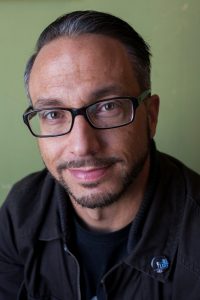Sam Pierstorff: Making It Happen
By Summer Krafft

Sam Pierstorff is fairly well praised as the most visual and influential poet in our community. This is likely because he does more than just perform and write poetry: he is also an English professor at Modesto Junior College, an event coordinator, host, and community arts advocate. More specifically, he was the coordinator and host of Modesto’s beloved SLaM On RyE for eleven years, and has been running Northern California’s most prestigious invitational poetry slam, The Ill List, for twelve years. The next being this Saturday, December 10th at The State Theater.
Sam started the SLaM On RyE in 2002. Of it, he said, “It started simply and very selfishly. I wanted to attend a slam, to perform my own work, which I had done for years in college, and there wasn’t anything in town. So, if it doesn’t exist, then create it. I was teaching poetry at the college at the time and I told the class to meet at the theater and invited anyone else who wanted to attend. We had somewhere between thirty and forty people that first night, maybe six poets, real low-key.” Needless to say, the event grew exponentially. “We had crowds that were bursting at the seams, well over one-hundred per night in a seventy-five-seat theater. The features were always amazing.”
However, after eleven years of monthly slams from 2002 to 2013, Sam called had to call it. “It was a tough decision, but I think the right one. I think it left a hole for new younger organizers to come in a fill that need. Other events haven’t been as successful because there wasn’t that one person willing to commit…I’m really proud of that decade. The best compliment I ever received were people saying that they were inspired to go home and write poetry, and this was coming from people who weren’t poets.” He is a regular attendee of other poetry events in the area, such as the readings at The Barkin’ Dog at Queen Bean’s Poetry Night.
SLaM On RyE does have the occasional resurrection. Often falling during April, which is National Poetry Month, but there have also been pop-up shows in September and November of 2015, as well as an All-Star Slam in April 2016. Of those resurrections, Sam quite simply said, “Sometimes I get bored and there’s nothing on the calendar,” pausing to laugh at the frankness of his statement. He added, “The Slam resurrections occur largely at random based on touring poets who call me and say they’re going to be around, and basically if I can build a slam around their arrival. Once, I got a call from Hollywood. When Hollywood calls, you answer. They wanted to build something around what we’ve been doing.” He says we can expect the next resurrection of SLaM On RyE in February or March of 2017.
However, in between the time of starting SLaM On RyE and stopping the monthly slams, he started The Ill List. Sam stated, “We had been doing SLaM on RyE for about three years, and I think we just wanted to go bigger and more competitive. We wanted to pit some of the best poets we could get against other poets and put that on display for our community. They weren’t getting exposure to national slam poets. I just wanted people to see that level of talent and performance.”
To promote the first Ill List, Sam said, “We probably went to thirty community college classrooms and explained what a poetry slam is and invited them to the slam, which was free. We had seven-hundred people show up for the first Ill List -everybody wanted in. It was kind of chaotic, but in the best way.” The success of the invitational poetry slam has continued to grow since then, welcoming some of the country’s biggest names in poetry to the Central Valley.
I asked Sam what have been some of the most outstanding memories at past Ill Lists for him. He said, “Two years ago, after Ferguson, the roots of the Black Lives Matter movements were just beginning to take hold. There was a lot of anger and animosity. I don’t censor the poets, I don’t know what they’re going to read, I just recruit who I think are the best. The influence of social issues of the day can affect poets, particularly poets of color who are on the front lines of some of those issues. Unbeknownst to me, we had several poets read very political poems. It was during those performances, for the first time in eleven years, I saw people stand up and leave. It was kind of heartbreaking. It was kind of embarrassing.” Sam’s response to such a heated event? He said, “It’s a free speech event, and I just really want our audience to listen to every poet and every perspective regardless of whether or not they agree. It’s part of the conversation that is poetry, and that was a really strange and influential moment. I think it’s part of my job to educate the audience that they may hear things that they completely disagree with. If art moves us in either direction, then that’s probably good art.”
Speaking of educating, Sam spends his days during the semesters with his students at MJC. Of the more powerful moments he’s experienced there, he said, “I think my most important class is my creative writing poetry class. The environment created in that room is so trusting and supportive, it’s almost like group therapy. Students share things about past traumas or abuse that have us in tears, and it’s so important for them to share that with other and to have that given back to them. This year in particular. I’ve always been pretty sensitive, but I’m forty-one and I’m just losing it. Those hug-it-out therapy sessions in the middle of poetry class are extraordinary. I know that has saved some lives.” Which speaks to the important work teachers and professors do that really only their students get to see and experience the value of. Sam seems to be one of the favorites on the MJC campus, likely largely for this reason.
Sam is committed to education outside of his classroom, as well. He mentioned that he got a call from Holly wood. That call was from Larry Rattner, an educational documentary film producer who had seen some of the work Sam was doing and reached out to him. Sam summarized it by saying, “I pitched an idea and he brought a camera crew and a director and we did a workshop at Pitman high school. As part of the program I recruited featured poets to film at that All-Star slam. But since they were already here, they thought, ‘there must be some poets who used poetry to better their lives.’” Sam acted as the coordinator and contact between all of the artists featured in the two documentaries and the filmmakers themselves. He also said, “The theme of the (second) documentary is really the power of poetry to change a community. To inspire, to influence, both individually and more globally. It creates empathy and understanding among really diverse group.”
So, what could possibly be next? Sam answered that question by saying, “I’m working with eight high schools and high school teachers to help educate and create poetry slam teams, one per high school, to compete against each other in an Ill List type environment in April 2017. I think for poetry to sustain itself in this community, we need younger and younger poets to be excited about its genre, to feel its power, and to tell their stories.” And the work continues.
Sam ended our interview by saying, “I could literally not do anything without community help, from buying a ticket to attending to sponsoring. People in Modesto thank me for these events, but I in turn thank them for allowing me to host these events.”








